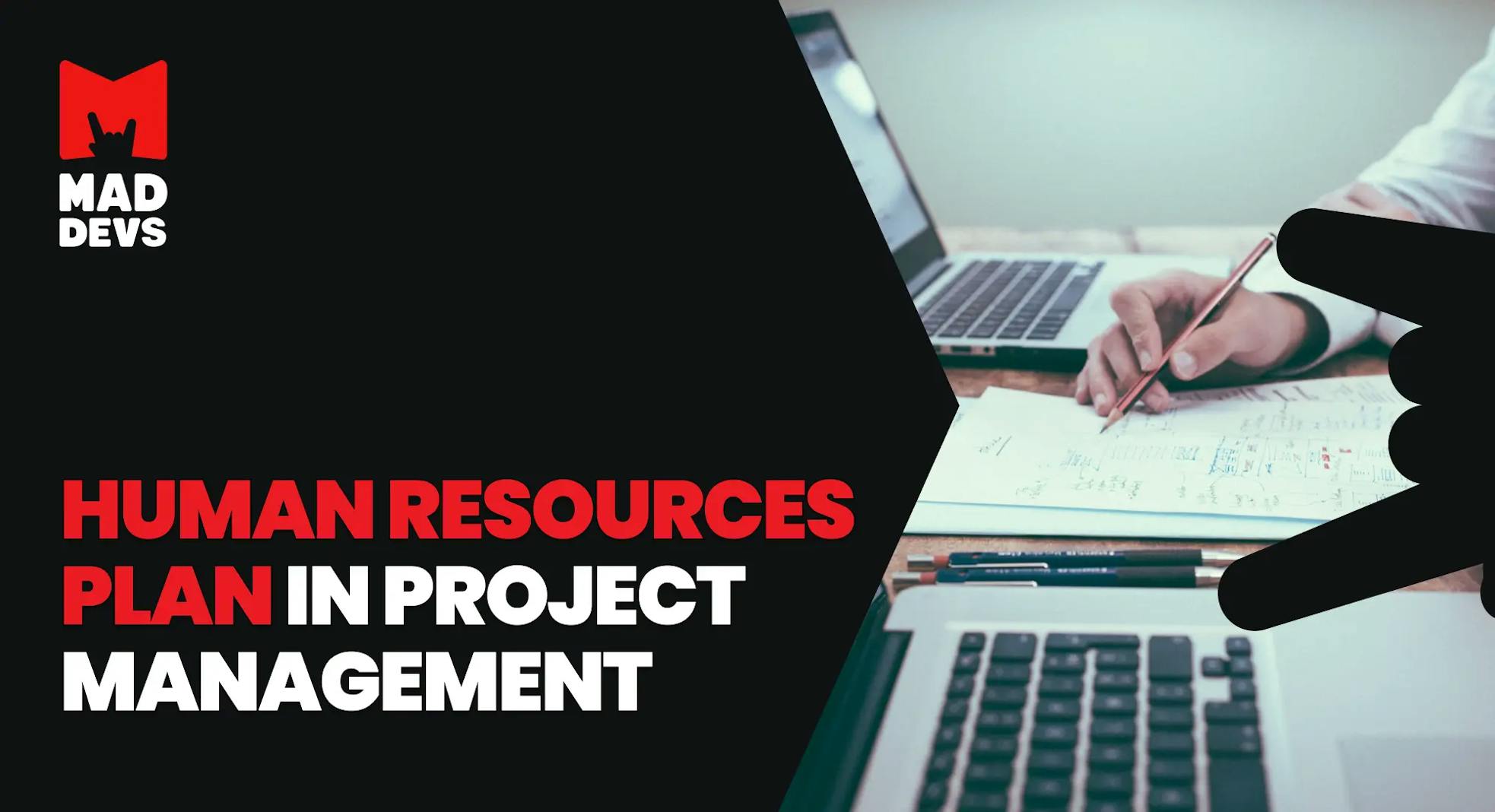Analyze with AI
Get AI-powered insights from this Mad Devs article:
Specialists play a vital role in successfully completing projects in any organization. Project and delivery managers are responsible for ensuring that the right professionals are distributed for the right jobs and have the necessary skills and training to do their jobs effectively during a project. They also play a key role in managing conflict and motivating employees to achieve project goals.
When used effectively, human resources plan can be a powerful tool for maximizing the success of your project management efforts. By developing a clear human resources plan, defining roles and responsibilities, creating a system of rewards and recognition, and managing conflict effectively, you can ensure that your projects are completed on time, within budget, and to the highest standards.
We asked our PMs and DMs what they think about the human resources plan in project management, why a PM or DM should have basic knowledge of HR, and what the benefits of human resources plan in project management are.
Defining the role of a human resources plan in project management
The general purpose of the human resources plan in project management is to ensure that the project has the necessary specialists with the right skills and knowledge to complete the work and that they are motivated to do their best. This includes identifying the workforce requirements, recruiting and choosing employees, training and developing them, managing performance, and providing support during transitions such as changes in leadership or project scope.
Inside the Mad Devs, all employees are divided into groups—those not involved in the project (bench), who ends the project or the project's scope, positions that are not in the company, and partner specialists. We can check all information through Jira or Enji SOW (Statement of work). This was done to see each employee's employment in each project and possible processing.
From the point of view of the delivery manager, at the stage of working with a lead, you are already starting to mentally build a team of current employees. After signing all the documents, you begin to draw up a portrait of an employee, for example, a portrait of a developer, a portrait of a PM, etc. The portrait indicates the competencies and skills that are necessary for this case. Based on the portrait, a team is selected from our employees or outside. But what to do with it now?
Here begins the breakdown of employees by roles. In Mad Devs, the CTO launched an employee grading system, allowing us to identify a specialist's level. Thus, when recruiting participants for the project, we already see what level each specialist has, which significantly simplifies the choice among specialists.
Moreover, not only professional roles matter but also psycho types. Given the nature of the employee, we try to give the appropriate role in the team. For example, those who like to plan can deal with organizational issues and be responsible for documentation. And the active ones can perform with a demo. This important feature allows you to consider that professionals feel comfortable and in their place.
I believe that Mad Devs stands out very much for its personnel approach, how they value and worry about their employees. And this idea goes from top to bottom. The company tries to seize the rough diamond and shape it (through training, motivation, etc.). PMs and DMs, for their part, adopt this experience and view of work and specialists. After that, they try to build processes, so professionals do not work for wear and tear and observe work-life balance.
The most difficult job in project management is working with people because sometimes team members cannot find a common language, and it is necessary to help build bridges between them. In addition, it is important to pay attention to the development of employees. This is important for everyone because, during work on the project, employees improve their skills, and the company becomes one more specialist, which means we have something to give the customer, and the customer turns out to be a specialist with experience and qualifications.
What does a human resources project manager do?
We figured out the concept, but who does all this? HR project managers oversee and coordinate all aspects of HR-related projects, from planning and budgeting to implementation and evaluation. They need to be able to communicate effectively with all stakeholders, including senior management, employees, and external vendors.
An HR project manager is responsible for leading and coordinating team recruitment plans. This includes developing project plans, managing timelines, and budgets, communicating with stakeholders, and ensuring the successful completion of projects.
Developers are essential to any business, but managing them can be challenging. When developers work remotely, communication is even more important to ensure everyone is on the same page. This blog post will explore tips for managing remote teams and keeping communication lines open.
In Mad Dev's case, it is PMs and DMs. We believe it is important to have and develop the skills of an HR manager and knowledge of psychology. Based on the psycho type of an employee, it is easier to choose a role for him and not to break a person.
On the other hand, it is important to resolve conflicts to be able to act as a mediator in time. To do this, you must learn to control your emotions and abstract from the situation to listen to the parties without prejudice. As part of their professional development, our PMs and DMs are trained with coaches to determine the psycho types of people.
How to use human resources plan to maximize your project management
Any project manager or delivery manager will tell you that having a clear and concise project management strategy is critical to the success of any project. This strategy should be designed to ensure that all team members are aware of their roles and responsibilities and the project's objectives. Furthermore, this strategy should be reviewed regularly to ensure it is still relevant and effective.
Define roles and responsibilities
Another important aspect of using human resources plan to maximize your project management is clearly defining roles and responsibilities for all team members. This will help ensure everyone understands their role in the project and is held accountable for their actions. Furthermore, this will also help to avoid conflict within the team.
Before assembling a team, we carefully study the documentation and requirements and interact with the customer and his team. After that, we build the project, and from this, we form the requirements for the team. If we do not have enough specialists from our side, then we turn to the recruiting department. The team may not meet in its entirety, some specialists may join the project at a later stage. This is where project management begins—a project environment is created, a workshop format, a framework, is adopted.
Create a system of rewards and recognition
A key element of any successful organization is creating a system of rewards and recognition for employees who go above and beyond the call of duty. This not only helps to motivate employees but also shows them that their hard work is appreciated. In addition, this can also help to attract top talent to your organization.
Within our company, we try to cheer up project participants with various achievements, milestones, business goals, income, etc. So that employees see the results of their work and do not forget what the final goal of their work is. Inside MD, the project manager is the servant leader. This specialist helps achieve goals, remove obstacles, find the right specialists if necessary, and facilitate communications.
Manage the team effectively
Last but not least, it is important to learn how to effectively manage conflict and blockers within the team. This includes being able to identify potential sources of problems, as well as working towards a resolution in a constructive manner. Furthermore, it is also important to keep in mind that not all problems can be resolved immediately, but it is important to have a plan in place for how to deal with it when it does arise.
In order for employees not to run away from the team, we hold retrospectives, syncs in different groups, 1-1. All this is intended not only to discuss the technical part of the project but also to identify blockers and conflicts and prevent employee burnout. At Mad Devs, we believe communication among employees is crucial, as everything is highlighted and not left unattended. Thus, problems are immediately prioritized, and looking for ways to solve them.
In software development, communication is key. Whether you're communicating with your team or your clients, communicating effectively can make or break a project. In our article "Communication in Software Development", we explore some of the communication challenges in software development and offer tips on overcoming them.
The benefits of a team recruitment plan in project management
There are many benefits to incorporating human resources plan into your project management strategy:
- Right specialists are in place from the start, so the collaboration between team members becomes smoother and more cohesive.
- Before starting to recruit a team, we draw up a portrait of the employee, which indicates the necessary competencies and skills for the project.
- Clear goals and smaller, manageable tasks keep team members motivated and focused.
- The PMs and DMs, before the project starts, can see the bigger picture of the required team.
- Improve communication and collaboration among team members, and create a more positive work environment overall.
- Improve productivity and quality while reducing turnover or absenteeism costs. Consider using tools like Octopus CRM, PhantomBuster, SalesFlow, LinkedHelper, and others. These automation tools combine LinkedIn outreach with CRM features, making them especially useful for recruiter workflows.
You shouldn't write off a person if there is a decrease in productivity behind him. Try to look at the situation from the other side. During 1-1, you can help to identify moments that demotivate the employee. So try to find solutions to problems together. Thus, you will keep the specialist in the company and maybe help him improve his level or change the field of activity to an adjacent one.
Creating a good engineering culture in your software team is important for several reasons. In this blog post below, we'll discuss tips for creating a good engineering culture in your software team.
How to develop a human resource management plan
The human resource management plan is a document that outlines how the human resources team will support the organization in achieving its goals. The plan should align with the organization's strategic and business objectives.
The human resource management plan should include the following:
- The roles and responsibilities of the human resources team
- The strategies for recruiting, selecting, and onboarding employees
- The training and development programs that will be offered to employees
- The performance management process that will be used to assess and improve employee performance
- The compensation and benefits programs that will be offered to employees.
Goals and objectives
So the first step in developing a human resource management plan is establishing the organization's goals and objectives. This will help to ensure that the plan is aligned with the overall mission and vision of the company. As has been repeatedly noted above, the goals and objectives should be specific, measurable, achievable, relevant, and time-bound.
Identify the workforce requirements
The next step is to identify the workforce requirements. This includes determining how many employees are needed and what skills or experience they should possess. The workforce requirements should be based on the needs assessment results and aligned with the organization's goals and objectives.
Assign roles and responsibilities
Setting clear roles and responsibilities is critical to a successful project. To do that, you must assess the skills and staff power needed to complete each project activity and create a structure for the resulting team.
As part of the planning process, this phase ensures that everyone you rely on to keep your project on track is available and prepared. It is better to describe all aspects of staffing the project in detail.
Training and development
Along with skills training, a project manager should consider how to onboard project team members and get them working together effectively. A team-building exercise may be used to introduce new team members to the project or orient them to the project.
Using productivity tools and other technology for the project may require training for some team members. In order to keep everyone working effectively for the team's good, the project manager may need to provide individual coaching, dispute resolution, and feedback.
Rewards and recognition
A project often requires employees to step outside their comfort zones or put in extra effort. Rewarding the team for their efforts and accomplishments can keep them motivated and provide a record of their performance.
What are the benefits of the human resource management plan
There are numerous benefits to developing a human resource management plan. Some of these benefits include:
- Ensuring that the human resources team is aligned with the organization's goals and objectives
- Clarifying the roles and responsibilities of the human resources team
- Creating a roadmap for recruiting, selecting, and onboarding employees
- Developing training and development programs that meet the needs of employees
- Improving employee performance through an effective performance management process
- Attracting and retaining top talent through competitive compensation and benefits programs.
The human resource management plan is a vital tool for any organization. It can help to ensure that the workforce is properly utilized and that employees are able to contribute to the organization's success. Organizations can improve their chances of achieving their goals and objectives by developing and implementing a human resource management plan.
Recently, there has been an increased focus on cross-functional collaboration within businesses. In the IT industry, cross-functional collaboration is often used to improve the efficiency of software development projects. With the right planning and execution, businesses can reap these benefits while avoiding the pitfalls of cross-functional collaboration.
And what is the result?
The role of human resources plan in project management is crucial to the success of any project. By definition, project management is the application of knowledge, skills, tools, and techniques to a broad range of activities to meet a particular project's requirements. Human resources plans play a vital role in ensuring that all aspects of the project are properly coordinated and executed.
An effective project manager will develop a clear strategy for managing human resources, define roles and responsibilities, create a system of rewards and recognition, and manage conflict effectively. By taking these steps, you can maximize your chances of success and ensure that your projects are completed on time and within budget.









